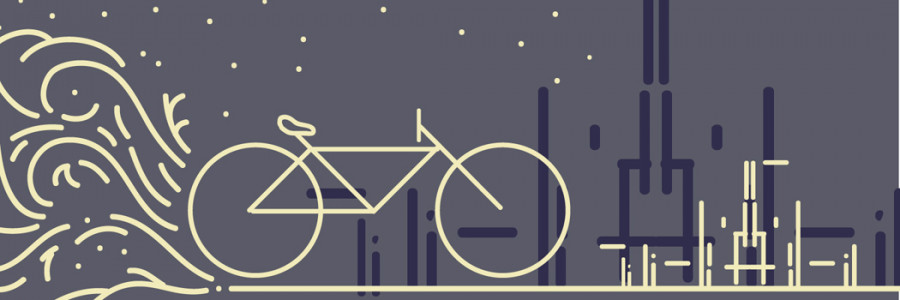Street Ghosts
Bike Couriers Play a Deadly Game of Shadows and Win
Tiny flesh sacks protected by flimsy foam dart between gas guzzling killing machines.
While the insanity of cyclists and cars fighting for territory in narrow streets sounds like a dystopian science fiction novel, it’s the lived reality of thousands on the island of Montreal.
Reclaiming the streets from the cars they were built for means putting your life on the line, but the bike couriers that laugh in the face of death on the daily manage to find zen between rows of squealing, honking deathtraps.
“It’s more about not disturbing the flow of traffic than it is about fighting constantly. Like a ghost, or an eagle,” former bike courier Duncan Campbell explained.
The best way to do your job “is to have no obstacles in your path,” he continued. “It’s not like you’re going to be cutting cars off and getting in their shit: mostly you’re trying to occupy a space that no one else is occupying.
“So you can be like a ghost, you can pass through the whole thing unnoticed.”
While in many ways being a bike courier is just like any other job, the couriers I spoke with agreed that bike culture lends itself to collectivism.
Car enthusiasts don’t have collective shops “where they’ll teach you how to fix your bike,” Winnipegger Cal Probetts said, in reference to collective bike co-operatives like Mile End Bike Garage, SantroVelo and Concordia’s Right To Move.
Rather than paying someone else to fix your bike for you, these institutions allow you to pay a membership fee in exchange for access to the community’s expertise and used bike parts.
“Bike culture isn’t exclusive,” Campbell commented. “All you have to do is have a bike and care about it.”
Bike culture is diametrically opposed to car culture in more places than on the road. Car culture is “more macho,” according to courier and part-time bike mechanic Felix-Antoine Tessier.
People invested in cars care a lot about displaying their wealth, he said. Bike riders are less concerned with price tags and more by the joy of a smooth-running machine.While it might not breed machismo, biking in any urban setting breeds a certain toughness. Being constantly on the brink of death results in a strange persona. A courier’s easy-going exterior often masks a defiance, a side effect of fighting for territory with two tonne mounds of metal every day.
“My goal [as a courier] was always to disrupt the flow of traffic as little as possible,” Campbell said, adding that even a seasoned cyclist is often aggravated by their automotive neighbours.
“You get in the habit of touching taxis when they’re too close to you, or just straight up yelling at old people who wander into the bike lane,” he said.
While not all bicyclists pursue urban planning reform, most are forced to aggressively combat the negative effects of poor municipal planning on their daily commute. Probetts summed it up with a giggle:
“I stay away from bike lanes, man.”
Any semi-serious cyclist knows to avoid the Maisonneuve and Rachel bike paths like the plague if they want to get anywhere fast. The bi-directional lanes are counterintuitive, serving as a half-hearted alternative artery.
The most flagrant example of the lack of consideration for cyclists is on Parc Ave., where a bike lane was stuck onto some cement as an afterthought, abruptly ending halfway up the mountain, leaving cyclists to hurtle pell-mell through hordes of pedestrians. This reporter knows from experience that it is nearly twice as fast to simply fight the 80 bus for space on the broad road than tolerate the “lane” constructed for bikes.
Campbell commented matter of factly.
“The best way to get honked at is to obey the letter of the highway safety code,” he explained. “If you take the lane when you’re allowed to, people don’t understand and they get pissed.”
Moving past a fear of death is what allows one to move as quickly and efficiently as possible.
“Sometimes I don’t get as scared as I should get,” Campbell admitted.
Tessier was more blunt.
“I’m actually a real lunatic on the road,” he said with a toothy grin. “I just zone out.”
But zoning out doesn’t mean forgoing constant analysis of the road.
“When I have an ounce of fear or inquietude, uncertainty, that’s when I’m most at risk of getting into an accident. It’s that constant need for analysis and daring that makes biking a game of shadows,” Campbell said.
“It’s a way a car can cast a shadow of momentum, and no-one will enter into that trajectory. You have to predict how other people will be viewing the road, and learn to sneak in behind a turning truck.”
Despite the risks, most couriers love what they do.
“It’s fucking awesome,” Tessier said. “I don’t feel like I’m working.”


_600_832_s.png)

_600_375_90_s_c1.jpg)
_600_375_90_s_c1.jpg)
_600_375_90_s_c1.jpg)